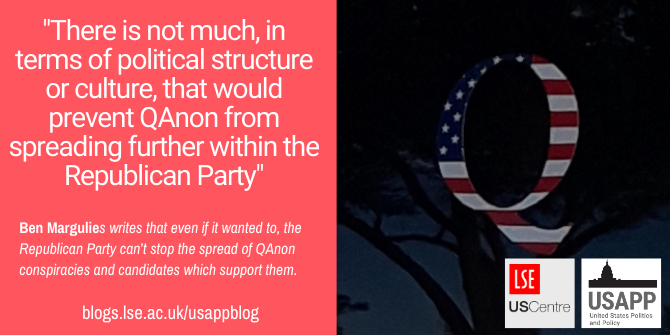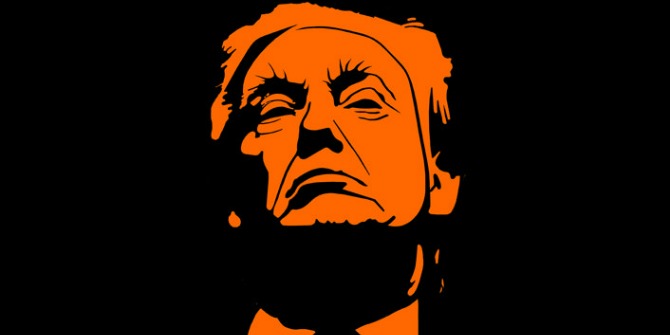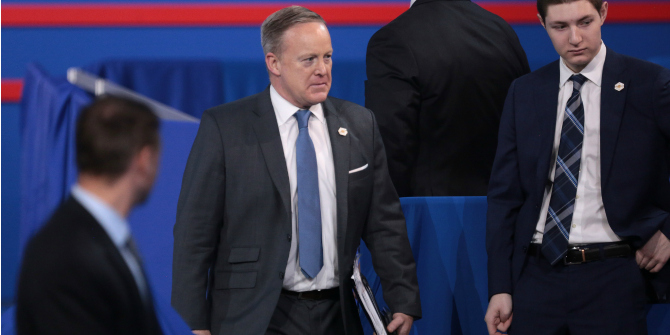 This election has seen the emergence of Republican Party candidates who support conspiracy theories like QAnon. Ben Margulies examines the rise of these candidates, and reminds us that US political culture has a long history of conspiracy theorizing, which can often lead to political violence. In addition, the decentralized structure of US political parties can make it difficult to screen out more extremist candidates from the grassroots, especially for the GOP which has become more ideologically extreme in recent decades.
This election has seen the emergence of Republican Party candidates who support conspiracy theories like QAnon. Ben Margulies examines the rise of these candidates, and reminds us that US political culture has a long history of conspiracy theorizing, which can often lead to political violence. In addition, the decentralized structure of US political parties can make it difficult to screen out more extremist candidates from the grassroots, especially for the GOP which has become more ideologically extreme in recent decades.
Marjorie Taylor Greene is the Republican nominee for the US House of Representatives in the 14th District of Georgia. She describes herself on Twitter as a “Conservative Republican Candidate,” which is unremarkable. Most commentators instead comment on her apparent adherence to QAnon, a conspiracy theory that, among other things, claims that a group of paedophile Satan-worshippers control a “deep state” that has set itself against President Donald Trump. “QAnon” refers to “Q,” the alleged source of a series of cryptic online messages (“Q drops”) allegedly revealing the inner workings of the conspiracy. (“Q” refers to a category of security clearance used by the US Department of Energy.)
Greene has espoused a number of conspiratorial beliefs in the past few years. According to CNN, she mused that the Charlottesville rally and the Parkland school shootings were “false-flag” attacks meant to undermine Trump, and suggested that John Podesta, Bill Clinton’s Chief of Staff, was part of a paedophile ring operating out of a Washington DC pizza parlor (the “Pizzagate” conspiracy). The QAnon Anonymous podcast has audio of Greene accusing Hillary Clinton of murdering John F. Kennedy Jr. to ensure she won the US Senate race in New York state in 2000 (specifically, in its August 19th episode). QAnon Anonymous was able to link two of her statements to specific “Q drops.”
At this stage, it is no longer surprising that Donald Trump isn’t interested in condemning QAnon. He vaguely endorsed it in a White House press conference in late August. It is also not surprising that the Republicans’ campaign apparatus is still backing Greene. Some Republicans have condemned QAnon, but individual Republicans have long denounced one or the other of Trump’s positions without seriously challenging his leadership of the party or his grip on its current thinking.
QAnon and the long history of conspiracy theories in the US
It would be easy to assimilate QAnon’s outlandishness to Trump’s, and to blame him for the conspiracy theory’s successful infiltration of the Republican Party. Trump’s appeal, in part, comes from his willingness to defy mores and propound lies that jibe with his followers’ emotional sense of how the world should be. Trump spins an alternate reality that allows his supporters to make sense of the world and their place in it, one that appeals to their “common sense” about how the world should be, as Catherine Fieschi explains in her recent book on populism. Since conspiracy theories do the same, Trump can use them to service his larger white-nationalist, authoritarian project. It may help him mobilize his followers – Yongkwang Kim’s research finds that exposure to conspiracy-theory narratives can encourage political action.
However, this explanation suffers from what social scientists call confounding variables: That is, a set of other variables that explain both Trump’s electoral success and QAnon’s. Firstly, US political culture embraces a long history of conspiracy theorizing. The first party to ever hold a presidential nominating convention was the Anti-Masonic Party in 1828, a party born of a conspiracy theory. Sen. Joseph McCarthy, a Republican spun baseless accusations from the floor of the US Senate. Geoffrey Stone records how the Republicans by and large backed McCarthy; until the 1954 Army-McCarthy hearings, Republican opponents of McCarthy were isolated.

Image credit: XPlayer2x / CC BY-SA
QAnon adherents occasionally tip over into violent attacks, but again, there is a long history of political violence in the United States. The white militias and lynch mobs that upheld the Jim Crow South operated with the toleration, support and sometimes participation of political and law-enforcement personnel – who, in this case, were Democrats. The Ku Klux Klan was influential in both parties during the 1920s, when it was briefly a mass-membership organization on a national scale. David Duke, a former grand wizard of the Ku Klux Klan, served as a Republican member of the Louisiana state legislature, and was the party’s standard-bearer in the 1991 Louisiana gubernatorial election.
Why US parties may be more vulnerable to extremists
There are also structural reasons that explain Republican vulnerability to extremism. In Europe, populist radical-right parties are typically tightly controlled by their leaders. The Front National/Rassemblement National does not hold primary elections for its candidates, which centrist parties have adopted in recent years. Geert Wilders is the only registered member of the Partij voor de Vrijheid (PVV) in the Netherlands. They may gesture to the far right or conspiracy theorists, but they need not include them in the party’s electoral lists.
US political parties, on the other hand, have no centralized structure. Most importantly, they do not really control who can run on their party tickets. Party elites can direct funding to certain candidates, and they can indicate approval or disapproval, but since candidates are chosen in primary elections, they cannot actually control who wins the nomination. This makes it difficult to screen out extremists, especially if the party’s existing officeholders and donors are divided or there is a large field of candidates. This is how Trump won nomination in 2016.
Lastly, the GOP has been becoming more ideologically extreme and politically uncompromising for decades. This “asymmetrical polarization” became increasingly apparent in the Obama era, but probably dates from at least the 1970s, when the Republicans absorbed the white-supremacist Southern Democrats. At the same time, the GOP also mobilized evangelical Christians and embraced the strongly neoliberal, harshly anti-Communist conservative movement around Ronald Reagan.
So why isn’t the GOP worried about QAnon?
All this explains why the Republican Party is vulnerable to infiltration from ideological extremes. However, we might still ask why the party seems so uninterested in fighting off QAnon. Again, if we look to Europe, we tend to find that populist radical-right parties often try quite hard to moderate their image. Marine Le Pen, current head of the Rassemblement National, stresses her belief in free speech, secularism and republicanism, and supported the expulsion of her own father from the party for his refusal to abandon openly anti-Semitic positions. The Sweden Democrats are divided over Trump because his radicalism conflicts with the party’s longstanding desire to move into the respectable centre-right. Many of these parties and leaders try to keep a border against the illiberal or violent right. They might hint that they agree with conspiracy theories or open anti-Semitism, but usually in ways that ensure deniability, as Ruth Wodak explains in The Politics of Fear.
Why doesn’t Trump try to police the boundaries to his right, then? This may partly be down to his reliance on the populist tactic of transgressing norms; policing himself may clash with his image. (Although less populist than Trump, British Prime Minister Boris Johnson uses a similar character trait to appeal to his supporters.) However, structure also plays a large role. Firstly, the Republican Party is an incumbent political party, which already has control over many of the institutions of government at the federal and state level. Indeed, the party dominates many Southern and Western states. It won 46 percent of the vote in the 2016 presidential election. It does not need to moderate to seek or to achieve power. The Sweden Democrats, on the other hand, operate in a multiparty system in which they are outsiders. They have no hope of holding power alone.
Secondly, the Republicans benefit from an array of institutions that hand power to minorities. The Electoral College and Senate over-represent the states the Republicans tend to control. Republicans have a free hand in many states to gerrymander electoral districts in their favour, which in turn makes it easier for extremists to win election. Republicans have sought to reduce voter turnout among Democratic constituencies (not least through interference with the US Postal Service), and have appointed judges who are hostile to federal enforcement of voting rights. The GOP has less need to moderate than comparable European parties.
Greene is still a relatively isolated figure in the Republican Party. There are other QAnon-affiliated candidates, most notably Lauren Boebert, candidate for the House of Representatives in Colorado’s Third District, and Jo Rae Perkins, Republican nominee for the US Senate in Oregon. But Boebert distanced herself from QAnon, and Perkins is unlikely to win.
That said, there is not much, in terms of political structure or culture, that would prevent QAnon from spreading further within the Republican Party. Even if party elites were to wage a concerted effort to build a wall against its adherents, they have limited control over the party’s grassroots. It is possible that a charismatic moderate might reshape discourse on the right, but it may be that the only way to stop QAnon is to somehow remove the demand for such extremist and conspiratorial thinking among the electorate.
Please read our comments policy before commenting.
Note: This article gives the views of the author, and not the position of USAPP – American Politics and Policy, nor the London School of Economics.
Shortened URL for this post: https://bit.ly/34D92KD
About the author
 Ben Margulies
Ben Margulies
Ben Margulies is a former lecturer at the University of Essex. Dr Margulies is also a fellow of the Royal Society of Arts.






